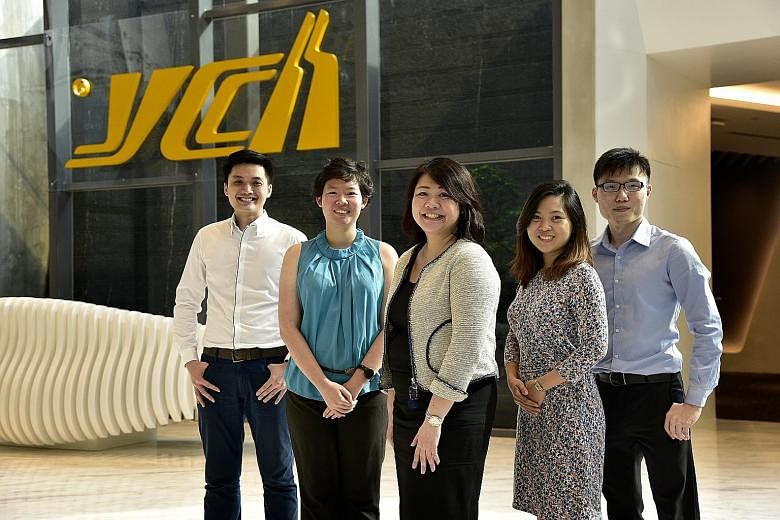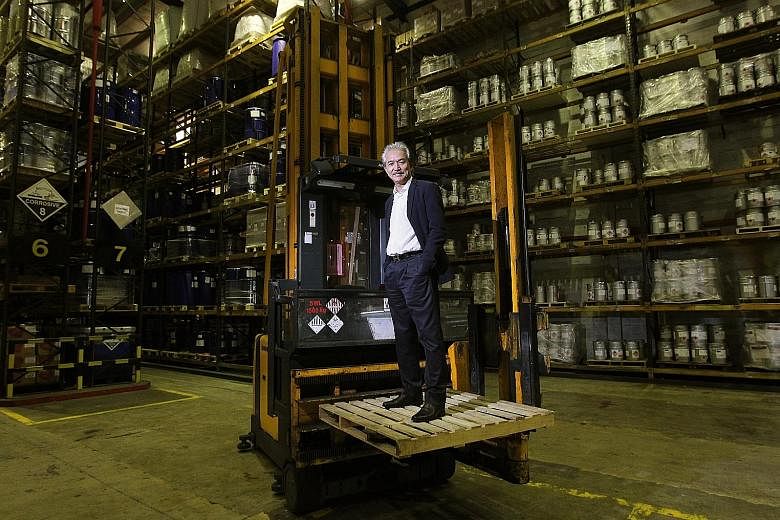No matter how times have changed and tested supply chain and logistics firm YCH Group, people have always come first, so at the heart of it all, it is about "teaching a person to fish", says head honcho Robert Yap.
Tasked with growing the firm over the years, the executive chairman found that that was the best way to stay ahead of the competition.
"When the company evolved from a passenger transport company into a logistics and supply chain business, I was faced with a real human capital challenge. Back in the 1980s, there was a lack of local talent for the industry.
"So I knew it was crucial to find people with a strong work ethic, people who could collectively strengthen our corporate culture of Rise - reliability, integrity, sincerity, enterprise."
His father founded the business in 1955 as a passenger transport firm, and Dr Yap took over in 1980.
Dr Yap was also instrumental in using technology to not only further its regional expansion, but also to keep its employees ahead of the game. He says: "When we walked the talk, it was always with the intent to stay a step ahead. This enterprising mindset meant we were always looking to innovate.
"It was part of our corporate DNA. And when we innovated together, we learnt together. We deepened our domain expertise, and imparted this to new talents as we grew and scaled internationally."
TECHNOLOGY HELPING, NOT DISPLACING, WORKERS
Early on, he knew technology was an ally to YCH's growth, and was required "to manage the complexities of a global supply chain business".
The firm bought PCs in 1988 and designed new IT solutions to support the best-in-class supply chain solutions, added Dr Yap.
Of those who worked on it, he says: "These instrumental pioneers are still with YCH today, and I fondly call them our gongfu masters as they oversee (what is called) our knowledge fusion management, infusing their rich knowledge and enterprising spirit into our new talents."
He told The Straits Times in 2013 that when he first invested in IT, people thought he was crazy, as things had always been done manually.
His foresight has led to the home-grown company extending its reach all over the region, including China, India and Australia.
The firm, which is part of the Human Capital Partnership (HCP) Programme, employs 5,000 people globally, including an 800-strong Singapore workforce.
It also developed its own proprietary software, has more than 200 software engineers across Asia-Pacific, and invests about 5 per cent of its revenue in IT each year.
Institute of Human Resource Professionals chief executive Mayank Parekh notes that technology can bring about new opportunities, such as better and more productive jobs.
"The challenge for HR professionals is to better understand the business imperative and anticipate the impact of technology on people, so that measures can be put in place to re-skill those affected for redeployment to other areas."
Ms Cecilia Ng, YCH group human resources head, who has been with the firm for two years now, says skills upgrading for employees is a must for productivity and "to have the ability to handle new systems".
"Robotics is tech innovation but we still need humans to operate it. In the logistics world, we're still a labour-intensive industry."
Experiential learning at the workplace has become one of the key pillars of YCH, she notes, and of the Supply Chain and Logistics Academy (Scala). Scala is also within the new Supply Chain City in Jurong Innovation District.
The facility will officially open on Sept 21, and Dr Yap, who is also president of the Singapore National Employers Federation, said last month: "The ecosystem that we hope to build at Supply Chain City is already thriving, with close partnership among training provider Scala, industry body Supply Chain Asia, innovation firm Y3 Technologies and investor group SC Angels (YCH's venture arm)."
Y3 Technologies also showcases how the firm invests in technology and people. The innovation and technology arm grew so large, it became a subsidiary on its own.
Analytics is also used for more than just business. Ms Ng says: "We use it to share where we are in terms of competitiveness and human capital strategy. That helps us in how we refine strategies."
The mindset of continuous improvement must be instilled in all staff too, as she says: "Ask any logistics company or even consultants about who can do innovation, and it's tough. You have to grow such talent from within.
"We predict in the next two years, people doing innovation in the firm will be very marketable, and that'll lead to another fight for talent."
FROM HUMAN RESOURCE TO HUMAN CAPITAL
The fierce competition for talent is not new, as Dr Yap has witnessed after taking over.
Ms Ng, who has spoken to several colleagues and those in areas such as operations, says: "In the earlier days as a family business, operations were small. There was no picking and choosing resources. Whoever was available, they'd gather them."
It was all hands on deck, leading to YCH logisticians honing several skill sets over the years for handling several industries, from electronics to oil and gas, to fast-moving consumer goods and healthcare.
She adds: "Over the last 10 to 15 years, there have been good initiatives to groom talents as well as opportunities given to external talents."
Ms Margaret Toh, now a business leader and executive director at YCH, is one example.
She says: "When I joined YCH, our business was mainly in Singapore and Malaysia. I had the privilege to participate actively in our growth journey across Asia-Pacific, first in an HR role and then for many years in both HR and business roles.
"I was fortunate to be in an environment where we have the opportunity to multitask and discover our strengths while we work as a team to grow our business."
Ms Ng urges companies "to be bold to give opportunities to people in different roles". Her firm also has management trainee or on-the-job structured programmes to assimilate new hires into the firm.
Mr Ngoh Jun Dat, 27, a YCH Young Talent Programme Scholarship recipient, joined the firm in July last year. He was put on a programme to lead supply chain operations across four distinct business sectors - pharmaceutical chemical goods, dangerous goods, electronics and cold chain.
He adds: "Each has different supply chain requirements. For instance... speed is critical for electronic goods... The nine-month immersion in these four areas... was key in helping me understand areas that can be improved through technology applications."
Ms Ng is also stepping up YCH's human capital game by restructuring her HR team by using what she calls the centre of excellence concept to these areas - talent acquisition, share services, business partnering, learning and development.
Before, the team was divided as such: Singapore operations, regional function, and the corporate learning and development team.
"Previously, the Singapore team would feel their role was only local. But as a Singapore company with its headquarters here, you should have the capability to oversee HR across the group as one team.
"The HR team will feel challenged and if you join the YCH HR team, you get the regional immersion. This is not unfamiliar to multinational corporations."
STAYING AHEAD
The constant fine-tuning of its human capital strategy means no one gets left behind at YCH.
Ms Ng notes there is a deep understanding of what each business head requires, and there are programmes implemented to meet their skill needs.
Deputy Prime Minister Tharman Shanmugaratnam had said at YCH's 60th anniversary celebrations in 2015 that the firm was "one of the first companies in Singapore to implement a progressive wage model", and an early adopter of SkillsFuture Initiatives.
The firm also has its own EduRise talent development programme, as it is called, for its 70 per cent Singapore core, and 30 per cent foreign talent, necessary in an international business.
Students and mid-career professionals learn through a dedicated curriculum and are trained in Singapore and abroad. Ms Ng says there are plans to grow this initiative further, "and make Singapore companies competitive. It's not about just sending Singaporeans overseas, but also cross-training and grooming the local talent to be aligned with headquarters".
The firm has also certified several older workers to become on-the-job trainers to impart skills to newcomers, and that exemplifies YCH's philosophy of teaching a man to fish.
As the firm continues to grow, Ms Ng notes: "Because of the regionalisation, it's about identifying high potential. Senior managers may be concerned about their jobs but it's about business continuity.
"Identifying successors is good for the company, and we need to educate staff. The SkillsFuture Leadership Development Initiative gels nicely with succession planning."
Firms will get funds from that initiative to groom leaders, and send selected talent on specialised courses and overseas postings.
Ultimately, YCH's "sustainable growth is attributed to our ability to constantly build our talent pool by imparting deep domain expertise with new technologies, and retaining these talents with a very strong family culture", says Dr Yap.
This feature on human capital is brought to you by the Ministry of Manpower.


